基于代词解释的动词快速预测受代词加工个体差异的调节
IF 1.8
3区 医学
Q2 AUDIOLOGY & SPEECH-LANGUAGE PATHOLOGY
引用次数: 0
摘要
本文章由计算机程序翻译,如有差异,请以英文原文为准。
Rapid prediction of verbs based on pronoun interpretation is modulated by individual differences in pronoun processing
ABSTRACT How quickly can pronoun interpretation affect the prediction of a following verb? Readers were presented with implicit causality contexts in which a specific pronoun and following verb were predictable. N400 and reaction time results indicated that predictable verbs were facilitated relative to unpredictable verbs when following predicted pronouns, suggesting that verbal predictions were rapidly updated based on pronoun interpretation. There was also some evidence for rapid updating of verb predictions after unexpected pronouns, but this was modulated by individual differences. Some readers appear to have placed higher weight on top–down implicit causality predictions to interpret unexpected pronouns, and others on bottom–up information from the gender on the pronoun. These differences in turn affected the N400 response to expected and unexpected verbs. The results together demonstrate that pronouns can be interpreted quickly enough to affect predictions about the following word.
求助全文
通过发布文献求助,成功后即可免费获取论文全文。
去求助
来源期刊

Language Cognition and Neuroscience
AUDIOLOGY & SPEECH-LANGUAGE PATHOLOGY-BEHAVIORAL SCIENCES
CiteScore
4.50
自引率
13.00%
发文量
70
期刊介绍:
Language, Cognition and Neuroscience (formerly titled Language and Cognitive Processes) publishes high-quality papers taking an interdisciplinary approach to the study of brain and language, and promotes studies that integrate cognitive theoretical accounts of language and its neural bases. We publish both high quality, theoretically-motivated cognitive behavioural studies of language function, and papers which integrate cognitive theoretical accounts of language with its neurobiological foundations.
The study of language function from a cognitive neuroscience perspective has attracted intensive research interest over the last 20 years, and the development of neuroscience methodologies has significantly broadened the empirical scope of all language research. Both hemodynamic imaging and electrophysiological approaches provide new perspectives on the representation and processing of language, and place important constraints on the development of theoretical accounts of language function and its neurobiological context.
 求助内容:
求助内容: 应助结果提醒方式:
应助结果提醒方式:


